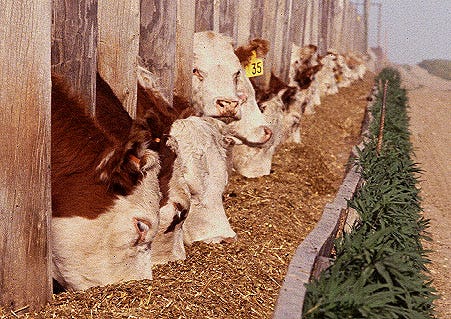BQA: Market rewards, consumer perception, and continuing credits

Consumers expect farmers raising cattle to produce safe and wholesome beef. To meet that challenge, beef producers created the voluntary Beef Quality Assurance (BQA) program in 1987.
BQA helps producers raise better beef through proper management techniques and a commitment to quality within every segment of the beef industry, so consumers can feel confident about buying beef.
UW-Madison Division of Extension and the Wisconsin Beef Council provide Wisconsin’s in-person BQA Certification. To learn more, visit https://bit.ly/2Tj9ycC. Over 1,800 producers were certified during the fall 2018 through spring 2019 in-person BQA trainings hosted across Wisconsin.
Does the market reward BQA certification?
The research study “Effect of Mentioning BQA in Lot Descriptions of Beef Calves and Feeder Cattle Sold Through Video‐based Auctions on Sale Price” was conducted by Colorado State University (CSU) to determine if the sale price of beef calves and feeder cattle marketed through video auction companies was influenced by the mention of BQA in the lot description. Partnering with Western Video Market, CSU reviewed data from 8,815 video lot records of steers (steers, steer calves or weaned steers) and heifers (heifers, heifer calves or weaned heifers) sold in nine western states from 2010–2017.
The study found a premium of $16.80/head for cattle that had BQA listed in the lot description. This value was determined by applying the $2.71/cwt premium found in CSU’s statistical analysis to the average weight of cattle in the study data. When the BQA premium was constant on a per head basis, it implied higher weight‐based premiums for lighter cattle (for example $3.73/cwt at 450 lbs./head) and lower premiums for heavier cattle ($2.24/cwt at 750 lbs./head).
Additionally, over the past 10 years of video auctions, frequency of BQA mentions has increased in the lot descriptions. This implies that many producers have proactively chosen to highlight and emphasize their participation in BQA when marketing their cattle.
Do consumers trust the BQA program?
Consumer research by the National Cattlemen’s Beef Association “Beef. It’s What’s for Dinner” marketing team found that it does. Their 2017-2019 research discussed beef production and introduced the BQA Program with nine consumer focus groups in three cities, Seattle, Philadelphia and Denver.
The focus group data along with 1,000 follow-up consumer surveys and online discussion groups found that positive beliefs about how cattle are raised for food improved by 26 points after learning about the BQA program. Learning about BQA increased consumers’ confidence in beef safety by 70%, animal welfare by 67% and their confidence about buying beef in the supermarket increased by 62%.

Raising consumer’s trust at the supermarket is significant, as 43% of consumers participating in the research believe that cattle live in confinement all of their lives, most have little knowledge of how cattle are raised, and the general consensus is there are large scale farms that operate like “corporations”, and then, there are small family farms. Wisconsin’s family farms can dispel these beliefs by proving their BQA involvement and having transparent conversations with their non-farming neighbors. Farmers are in the best position to dispel consumer misconceptions about how cattle are raised and the environmental footprint of U.S. beef production.
BQA Certification
A farm’s BQA certification is valid for three years. In addition to in-person trainings, online BQA certification is available 24/7 at BQA.org through cow-calf, stocker/backgrounder and feedyard modules.
Rather than waiting years to recertify, producers may earn BQA continuing education credits (CECs) by attending Division of Extension-led workshops that include BQA topics. At the time of a producer’s renewal, sending three BQA-CECs to the Wisconsin Beef Council earns a free three-year renewal. A calendar of BQA certification and continuing education is maintained at https://fyi.extension.wisc.edu/wbic/calendar/
BQA Continuing Education Credits are available when attending the Wisconsin Cattlemen Association’s Winter Conference on February 21 at the Chula Vista, Wisconsin Dells. Wisconsin Cattlemen are including the Division of Extension Dairy and Beef Well-Being program within their conference. Cattle well-being is a major part of BQA, therefore two BQA continuing education credits are available from this conference. Visit https://www.wisconsincattlemen.com/events/winter-conference for complete details.

Sandy Stuttgen,DVM, is an agriculture educator of the UW-Madison Division of Extension for Taylor County.
